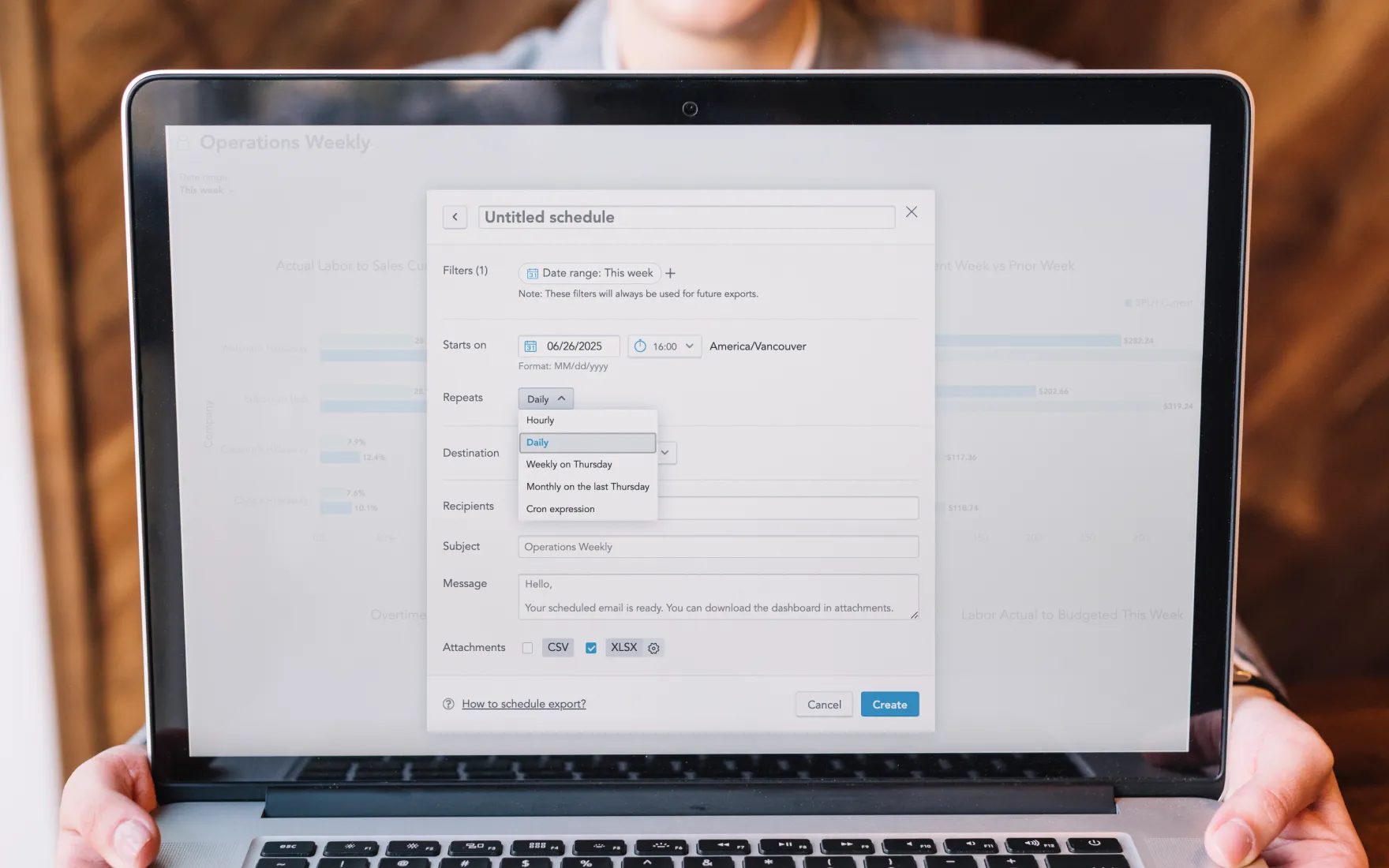Mastering Seasonal Hiring: Recruiting Temporary Employees

Whether you’re a new or experienced restaurant owner, seasonal hiring can be a daunting task especially while facing a competitive labor market. With the restaurant industry being the second largest creator of seasonal employment in the US, restaurant owners should start their seasonal hiring sooner rather than later to ensure they’re fully staffed for the upcoming summer season. Despite the potential challenges in the current labor market, with the right strategy, hiring temporary employees can be a breeze.
In this article, we’ll cover the basics of seasonal employment, while also exploring the best practices for mastering seasonal hiring in the restaurant industry.
What is seasonal employment?
Seasonal employment refers to temporary work that’s based on specific seasons or periods of the year to help with increased demands. It typically occurs in industries that experience fluctuations in demand or need additional labor during certain times of the year. The restaurant industry tends to experience higher demands during the summer months because of an increase in tourism during this period.
What are the advantages of hiring seasonal workers?
Seasonal employment can offer several advantages for both employers and employees.
The advantages of hiring temporary employees:
- Flexibility to adjust the workforce as needed
- More cost-effective than full-time employees since seasonal employees typically don’t receive benefits or other associated costs
- Seasonal workers can bring specialized skills or experience to the job
- Reduces the need for overtime amongst existing employees, which can improve employee satisfaction and reduce labor costs
The advantages of being a seasonal employee:
- Flexibility to take on temporary work while being in between jobs or to make additional income
- Opportunity to develop skills and gain work experience
- Potential to build resume and fill in any gaps
- Ideal when study or traveling abroad for a prolonged period of time
Overall, seasonal employment can be a mutually beneficial arrangement for both parties involved.

Why is seasonal employment important for restaurants?
Hiring temporary workers for the summer season is extremely important for restaurants in order to meet the increased demand during this time of year. Between the warm weather and kids being off from school, the summer brings a higher demand for traveling and tourism. And if your restaurant has a patio, this will require temporary workers to cover the additional capacity.
Without seasonal staff to support your business, your employees may begin to feel stretched and overwhelmed, leading to low employee morale and poor customer service. Both of which can negatively impact your business.
10 Tips to Master Your Seasonal Hiring
1. Start Recruiting Early
Starting your recruitment early gives your business a chance to secure the best candidates before your competitors swoop them up. Additionally, you’ll have more time to screen, interview, and train new hires before the rush begins. This will result in getting your top pick of seasonal hires, which will help you maintain higher-quality service for your customers. We recommend starting recruitment at least two months in advance of your peak season to allow plenty of time for the hiring and training process.
2. Develop Clear Job Descriptions
After determining what seasonal jobs need to be filled at your restaurant, the next step is to develop clear and detailed job descriptions for each role. Job descriptions should include the duties and responsibilities of the role itself, as well as the qualifications and availability required for each position. Setting clear expectations upfront can help your restaurant find suitable candidates quickly and efficiently. It can also lead to lower turnover since seasonal hires won’t by surprised by their responsibilities and the hours required.
3. Utilize Multiple Recruitment Channels
Utilizing multiple recruitment channels for seasonal hiring can attract a diverse pool of candidates. You can use a combination of online job boards, social media platforms, temporary staffing agencies, and local newspapers to reach out to potential candidates. Partnering with local schools or universities can also help you target students who may be looking for seasonal or summer employment. Depending on the job requirements, the target demographic, and your budget, you can decide which recruitment channels are the best for your business. No matter the position you’re trying to fill, diversifying your recruitment channels can increase your chances of finding the most suitable candidates.
.avif)
4. Offer Competitive Wages and Incentives
Seasonal employment can be competitive with many businesses trying to hire from the same pool of candidates. Offering competitive wages and incentives can be a great way to stand out and attract high-quality seasonal employees. On top of offering higher wages, incentives can include flexible scheduling, employee discounts, and paid time off. Having an attractive total compensation package for your seasonal employees can improve morale, productivity, and overall job satisfaction.
5. Streamline Your Interview Process and Training
Since seasonal employees will be working with you for a limited time, it’s imperative that you have a streamlined interview process and training program in place to optimize your time and resources. A streamlined interview process with targeted questions can help you identify the key skills and experience required for each position to quickly assess each candidate’s suitability.
When it comes time to train your new hires, opt to have them start on the same day to efficiently onboard and train them using a structured learning plan. It’s recommended to have training documents and videos prepared ahead of time to ensure no time is wasted during the training period. This way, your new team will be up and running as quickly as possible, while also providing them with the knowledge and tools to be successful.

6. Build a Talent Pipeline
Building a talent pipeline can help to create a pool of qualified candidates to draw from when hiring for seasonal positions. Having a reliable talent pool will reduce the time and effort required to recruit new seasonal employees. You can do this by establishing relationships with local schools, community colleges, or culinary institutions to create a talent pipeline for your restaurant. This approach can help you access a steady stream of candidates interested in seasonal opportunities or even long-term careers in the food service industry.
7. Offer Employee Referral Bonuses
Offering employee referral bonuses for seasonal employment can be a powerful way to tap into your current workforce's network and attract qualified candidates. Referral bonuses can take the form of cash, gift cards, or prizes. This method can be especially effective because current employees have a vested interest in referring only the most qualified and suitable candidates since they don’t want to put their reputation on the line for a low-quality referral. You can add a stipulation that the referred employee must stay until the end of the seasonal period. This can lower turnover rates and prevent you dishing out referral bonuses for those who quit mid-season.
8. Host Hiring Events
Hosting hiring events, such as job fairs or on-the-spot interview events, can be very effective for streamlining the recruitment process, especially if you’re looking to fill multiple positions. These events give you the opportunity to meet multiple candidates in one day and conduct quick assessments to identify the most suitable applicants for further interviews or immediate hiring. Hiring events can also help you build brand awareness and attract candidates that may not have otherwise considered your restaurant for seasonal employment.
9. Leverage Social Media and Networking
Leveraging your social media platforms and personal connections can help you connect with more potential candidates. Social media platforms like Facebook, Instagram, LinkedIn, and Twitter are great places to post job openings, share information about your restaurant business, and engage with potential applicants. You can also utilize your existing personal network by encouraging friends, family, employees, and followers to spread the word within their own networks. Overall, social media and networking can give you the opportunity to reach a wider audience of potential candidates for your seasonal hiring.
10. Retain Top Performers for Future Seasons
Retaining top performers for future seasons can help you fill positions quickly and efficiently in years to come. At the end of each season, compile a list of your top-performing seasonal employees to invite them back for the upcoming year. To retain top performers, you should create a work environment that seasonal hires would want to return to. This could include creating a positive work environment, offering competitive compensation packages, and creating opportunities for advancement. Maintaining relationships with your high-performing employees can save you time and effort in your future recruitment process.
Final Thoughts on Seasonal Hiring
As a restaurant owner or operator, the way you tackle your seasonal hiring can either make or break your success during peak season. With the right approach and preparation, you can seamlessly transition into the peak season with the support of your new seasonal team. Overall, successful seasonal hiring can be an opportunity for your restaurant to build a stronger workforce, create positive customer experiences, and boost profits.
Seasonal hiring and recruitment doesn’t have to be complicated when you’ve got Push. Learn how we can help you streamline your restaurant’s people management just in time for the upcoming summer season.



